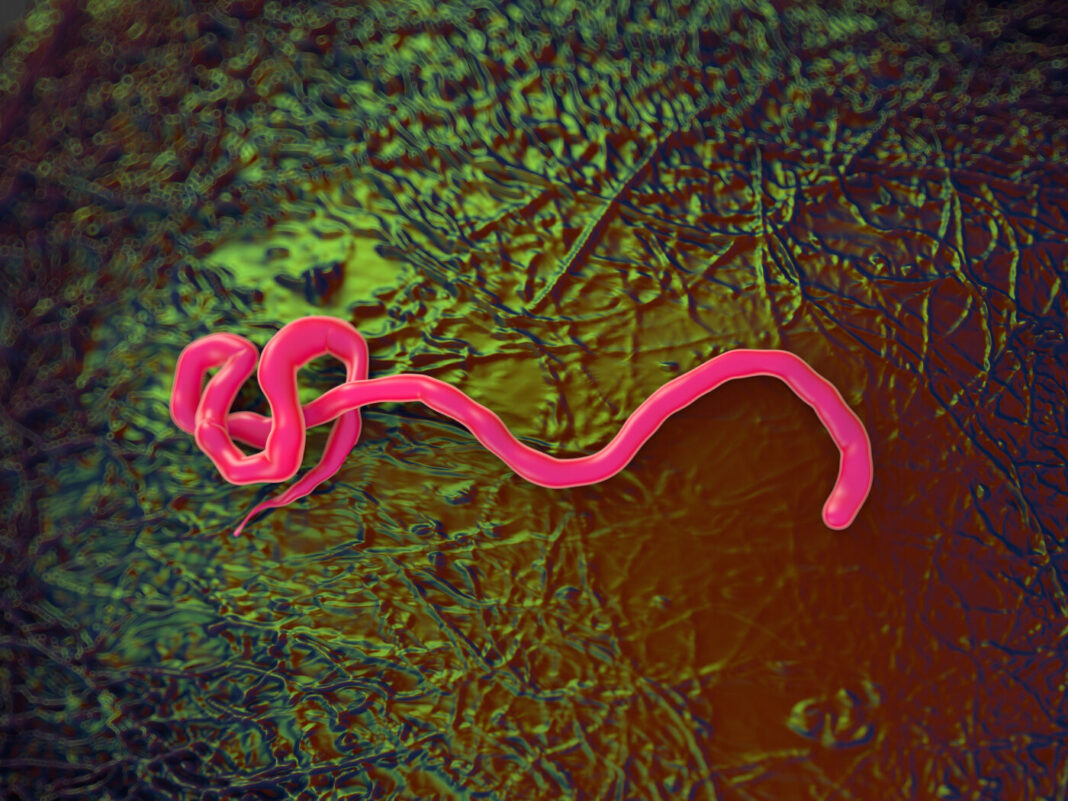Welcome news for Ebola virus disease prevention was published yesterday in two papers presenting data showing that Johnson & Johnson’s (J&J) two-dose Ebola vaccine regimen is safe, well tolerated, and produces a strong immune response in people over the age of one. This news comes five years after the largest outbreak of Ebola since its discovery and just one month after an Ebola outbreak was declared in the Ivory Coast.
The study aimed to assess the safety and long-term immunogenicity of a two-dose vaccine regimen. The first vaccine is the adenovirus type 26 vector-based vaccine encoding the Ebola virus glycoprotein (Ad26.ZEBOV). The second is the modified vaccinia Ankara vector-based vaccine, encoding glycoproteins from Ebola virus, Sudan virus, and Marburg virus, and the nucleoprotein from the Tai Forest virus (MVA-BN-Filo).
The authors found that the vaccine regimen was well tolerated and induced antibody responses to Zaire ebolavirus 21 days after the second dose in 98% of participants, with the immune responses persisting in adults for at least two years.
Conducted in Sierra Leone, the EBOVAC-Salone study is the first to assess the safety and tolerability of this vaccine regimen in a region affected by the 2014–2016 West African Ebola outbreak, which was the worst on record. It is also the first study reporting the evaluation of this vaccine regimen in children.
The data were published in The Lancet Infectious Diseases in two separate papers: “Safety and immunogenicity of the two-dose heterologous Ad26.ZEBOV and MVA-BN-Filo Ebola vaccine regimen in children in Sierra Leone: a randomized, double-blind, controlled trial” and “Safety and long-term immunogenicity of the two-dose heterologous Ad26.ZEBOV and MVA-BN-Filo Ebola vaccine regimen in adults in Sierra Leone: a combined open-label, non-randomized stage 1, and a randomized, double-blind, controlled stage 2 trial.”
During the 2014–16 outbreak of Ebola in West Africa, 28,652 cases and 11,325 deaths from Ebola were reported. Approximately 20% of cases were in children under 15 years, and children younger than five years are at a higher risk of death than adults.
“This study represents important progress in the development of an Ebola virus disease vaccine regimen for children, and contributes to the public health preparedness and response for Ebola outbreaks,” said Muhammed Afolabi, MD, assistant professor at the London School of Hygiene and Tropical Medicine.
The clinical trial recruited participants from September 2015 to July 2018. The study was divided into two stages. In stage one, 43 adults aged 18 years or older received the Ad26.ZEBOV vaccine followed by the MVA-BN-Filo vaccine after 56 days. In stage two, 400 adults and 576 children and adolescents (192 in each of the three age cohorts of 1–3, 4–11 and 12–17 years of age) were vaccinated with either the Ebola vaccine regimen (Ad26.ZEBOV followed by MVA-BN-Filo) or a single dose of a meningococcal quadrivalent conjugate vaccine followed by placebo on day 57. Adults participating in stage one of the study were offered a booster dose of A26.ZEBOV two years after the first dose which induced a strong immune response within seven days.
“To protect people from Ebola, we will need a range of effective interventions,” said Daniela Manno, clinical assistant professor at the London School of Hygiene and Tropical Medicine. “These findings support the additional strategy of providing an Ad26.ZEBOV booster to previously immunized individuals at the start of an Ebola virus disease outbreak.”
The study findings have already contributed to the approval and marketing authorization of the two-dose Ebola vaccine regimen in July 2020 by the European Medicines Agency, for use in both children and adults. It also contributed to the WHO Prequalification in April 2021, which will facilitate formal registrations of this vaccine regimen in countries at risk of Ebola virus disease outbreaks.
“The threat of future Ebola virus disease outbreaks is real and it’s important to remember that this disease has definitely not gone away,” noted Deborah Watson-Jones, PhD, clinical epidemiologist from the London School of Hygiene & Tropical Medicine. “Despite the additional global challenges around COVID-19, we must not slow down efforts to find effective ways of preventing Ebola virus epidemics and, should outbreaks occur, of containing them rapidly. Vaccines have a key role in meeting both of these objectives.”
In May 2021, J&J said it would donate thousands of Ebola vaccine regimens in support of a WHO early access clinical program launched in response to an outbreak in Guinea and aimed at preventing Ebola in West Africa. The program began by vaccinating health workers, other frontline workers and others at increased risk of exposure to the Ebola virus in Sierra Leone. To date, more than 250,000 individuals participating in clinical trials and vaccination initiatives have received at least the first dose of the J&J Ebola vaccine regimen, including 200,000 who have been fully vaccinated. Further studies are being carried out in Sierra Leone to investigate whether the vaccines are safe and induce immune responses among infants aged under one year, and to follow up the adult and child participants over five years to assess the potential for long term protection.
“This is an example of crucial research which brings together scientists from Africa with partners in the north and pharmaceutical companies to tackle a major public heath threat in Africa,” said Sir Brian Greenwood, MD, professor of clinical tropical medicine, London School of Hygiene and Tropical Medicine.
The research in Kambia district was a collaboration between the London School of Hygiene & Tropical Medicine and Sierra Leone’s College of Medicine and Allied Health Sciences under the EBOVAC1 project.






